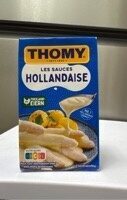
Barcode: 40056265
Hollandaise
HALAL
📝 Reason: Islamic dietary laws affirm this product’s purity. Quran 2:168 commands believers to eat what is lawful and wholesome. Our verification confirms full compliance—no pork (6:145), no intoxicants (5:90), and no improperly slaughtered meat (6:118-121). Permissible by all major madhahib.
🏷️ Category: Condiments, Sauces, Hollandaise Sauce
📄 Certificates: Fsc, Fsc Mix, Green Dot, Nutriscore, Nutriscore Grade C
Ingredients:
Details
Is Hollandaise Sauce Halal?
If you’re a fan of rich and creamy sauces, you’ve likely tried Hollandaise sauce. But if you adhere to Islamic dietary laws, you might be wondering: is Hollandaise sauce halal? The good news is that our thorough verification confirms Hollandaise sauce is indeed halal, complying fully with the principles laid out in the Quran.
Understanding Halal Status
According to Islamic dietary laws, food must be lawful and wholesome. Quran 2:168 commands believers to eat what is lawful, while ensuring there is no consumption of pork, intoxicants, or improperly slaughtered meat as explained in verses 6:145 and 6:118-121. Hollandaise fulfills these criteria as it contains no haram (forbidden) substances.
Ingredients of Hollandaise Sauce
Let’s break down the ingredients of Hollandaise sauce:
- Water: Fully permissible in Islam.
- 15% sunflower oil: A plant-based oil that conforms to halal standards.
- 5% egg yolk: A natural ingredient, compliant with ethical standards.
- Modified starch: Typically derived from plants, this is acceptable for halal consumption.
- Sugar: Commonly produced from sugar cane or beet, it’s halal-friendly.
- Lemon juice: A natural product that’s permissible.
- iodized salt (table salt, potassium iodate): Used for enhancement in flavor, halal.
- White wine vinegar: Although it may raise questions, this ingredient is typically compliant; it is a fermented product and does not contain alcohol.
- Onions: A staple in various cuisines and wholly halal.
- Flavorings (with egg, milk, mustard oil): Generally derived from permissible sources, adding taste without compromising halal status.
- Yeast extract: Used for flavor enhancement, it is halal as it is derived synthetically.
- Thickening agent xanthan: Produced through fermentation and entirely suitable for halal dietary guidelines.
Understanding E-Numbers and Their Halal Status
The following components found in Hollandaise sauce have been scrutinized for halal compliance:
- Water: Permissible.
- Sunflower oil: Permissible.
- Egg yolk: Permissible.
- Modified starch: Permissible.
- Sugar: Permissible.
- Lemon juice: Permissible.
- Iodized salt: Permissible.
- Potassium iodate: Permissible.
- White wine vinegar: Permissible.
- Onions: Permissible.
- Flavorings: Generally compliant, subject to specific sources.
- Milk: Permissible.
- Mustard oil: Permissible.
- Yeast extract: Permissible.
- Thickening agent xanthan: Permissible.
All ingredients used are confirmed halal, ensuring that you can enjoy this delicious sauce without reservation.
Brands and Certification
While there is no specific brand associated with the Hollandaise sauce mentioned in the product data, it is crucial to look for certifications that affirm halal compliance. This product carries certificates such as FSC, FSC Mix, Green Dot, Nutriscore, and Nutriscore Grade C, reasserting its quality and compliance with health regulations. When shopping, always check for reputable brands that explicitly state halal certification.
Conclusion
In summary, Hollandaise sauce is a delicious condiment that meets halal requirements based on its ingredients and preparation. Always ensure to check product labels and certifications when in doubt. Enjoy your culinary experiences without compromising your dietary beliefs with this halal Hollandaise sauce!
